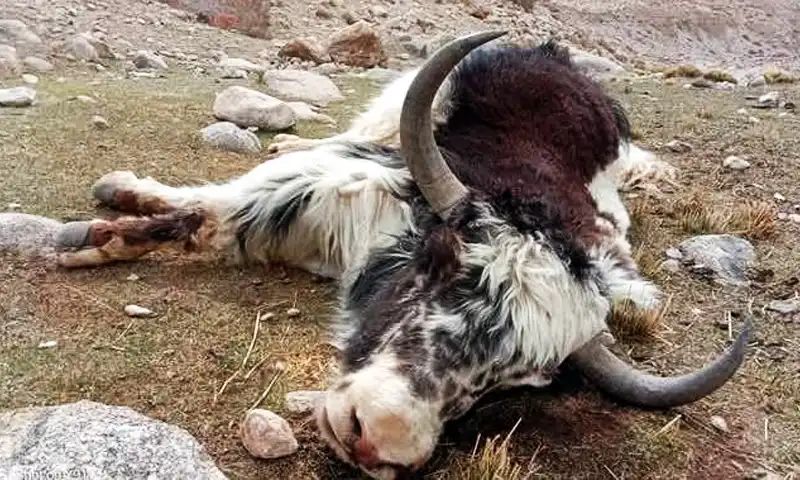- Web Desk
- Feb 24, 2026
Mysterious disease kills over 100 yaks in Shimshal Valley
-

- Tanveer Abbas
- May 06, 2025

GILGIT: A mysterious and deadly disease has killed more than 100 yaks in the remote pastures of Shimshal Valley in Hunza district of Gilgit-Baltistan.
According to locals, the yaks exhibit alarming symptoms, including severe abdomen swelling, followed by blood dripping from their mouths and noses, and deep cuts on their legs.
Naimat Karim, a local resident, said as of now, at least 108 yaks have been reported dead, and there are fears that the toll may rise, as several animals remain missing. Karim said the disease first emerged last summer when many yaks died. “This disease had previously affected younger yaks (aged 3 to 6 months) last year, but this time, it has spread to adult animals as well.”
Between India and Pakistan, families divided by Kashmir
He said the disease’s spread to adult yaks this year is unprecedented. “The death of 108 yaks marks the first and largest loss in Shimshal’s history. Currently, more than 80 adult yaks are affected, and further deaths are feared,” Karim added.
He also pointed out that last year, the Livestock Department had sent a low-grade employee who only provided first aid and vaccinations, but the actual disease was never properly diagnosed or treated.
Shimshal’s economy relies entirely on livestock, particularly yaks, which are the primary source of income for education, healthcare, and household expenses. The loss of over 100 yaks—the largest in Shimshal’s history—threatens not just financial stability but complete economic collapse for many families.
The residents of Shimshal called for immediate and effective veterinary intervention to prevent further devastation and ensure the survival of their livelihoods.
Livestock and Dairy Development Deputy Director Shehzad Arif said a rescue team has been dispatched and is expected to reach Shimshal Pass by May 9. He said the pass, where locals keep their livestock, is located a three-day walk from the valley at an altitude of 16,000 feet.
“At Shimshal Pass, where locals herd over 1,500 yaks, the availability of grazing grass is minimal. The rise in tourism further exacerbates the situation,” Arif said, highlighting the impact of increased foot traffic on already scarce resources.
He explained that the lack of food leads to weak newborn yaks, and the mother yaks also become debilitated, leading to intense competition for the little available food. “The fittest yaks graze on what little is available, while the weaker ones resort to licking sand, which causes sand to accumulate in their intestines. As a result, they become dehydrated within a few days and ultimately die,” he added.
UK to tighten student visa rules for Pakistan
Another contributing factor, Arif said, is the weakening of mother yaks, resulting in either weak or stillborn calves, with those that do survive being frail. “The mother yaks’ weakness also prevents them from providing the necessary nourishment to their offspring,” he explained.
Arif confirmed that a team from Aliabad has been sent, and they are expected to reach Shimshal Pass within three days and give proper treatment and vaccination. “The team will also assess the situation on the ground and calculate the exact number of deaths,” he added.




